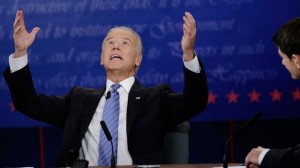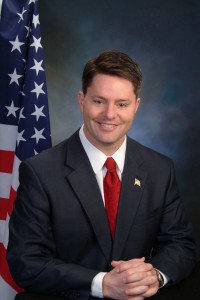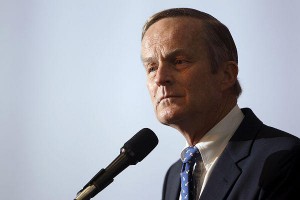Click here for Nate’s latest assessment of a 90% probability of an Obama win.
|
As always, Nate Silver cuts through all of the conflicting poll data and screaming head spin to give a true snapshot of the race as it stands today. Here’s an excerpt:
Click here to read the full article.
But Biden unleashed revealed something about what has happened to the liberal political mood in this season. Beneath the back and forth over the quality of Obama’s economic stewardship, and the predictable jabs at the wealth and tax records of the first nominee since 1940 who has substantial private sector experience, there has been another context to this campaign, that is both retrograde and novel at the same time: namely, the left’s strategy of attack by caricature and ridicule, and the implicit worldview that conservatism is an oddball blend of plutocracy, racial resentment, sexual backwardness, and selfishness. The backward leaning part of the theme is the resemblance to Franklin Roosevelt’s and Harry Truman’s exuberant Republican bashing, at least in the brutal depiction of the GOP agenda. But FDR’s tongue-lashing had a notable high-mindedness: the broadside in his 1936 acceptance speech about mastering the forces of greed in a second term was exquisite rhetorical theater of a kind Barack Obama as president has utterly failed to master. Moreover, the New Deal’s anti-Republican barbs were accompanied by a raft of prospective domestic legislation.
The novelty is in the reversal of a generation of Democratic attempts to soften Republican/conservative opposition through persuasion. During the Clinton era, Democrats regularly sought to co-opt Republicans by shifting right on welfare and budgets, and moved back and forth between partisanship and outreach. Nor is there much trace of the feints liberals made a decade ago toward evangelicals, much less Obama’s 2004/2008 emphasis on reducing partisanship. Spared the tactical imperative of persuading even mainstream conservatives, or crafting a legislative portfolio that could overcome gridlock, liberalism circa 2012 is largely a negative project aimed at dismissing the Right’s substantive and intellectual credibility. Nancy Pelosi’s eye-rolling at doubts about the constitutionality of the healthcare law, the establishment media’s persistent denunciations of the Tea Party as Neanderthal relics of George Wallace, the African American media’s trope that conservatism is racial backlash are all of a piece with Biden’s tactic of describing conservative economic policies as discredited claptrap. Read the rest of… After 80 years in print, Newsweek will cease production on paper and move to an online-only product. [Bloomberg] Fox News matched some of the network’s ratings records with the first three Presidential debates. [THR] With New York Times staff still at odds with management on contracts, they may begin withhold bylines and photo credits until an agreement can come together. [Romenesko] In a recent speech to the Accuracy in Media conference, “ObamaNation: A Day of Truth,” contributing RP Artur Davis had high praise for former President Ronald Reagan, saying that “Reagan took liberty and freedom, which are very imaginative concepts, and he gave them a power they had never had before.” Speaking of the media, Davis said, “They don’t matter as much as they used to matter. That’s just the reality. Think about it: The New York Times—their own ombudsman says that their liberalism permeates their newsroom. Their own ombudsman says that they treat the liberal agenda as a cause to be nurtured instead of something to be inspected or analyzed. Their own ombudsman said that.” You can watch his full speech below, or read the transcript here:
Krystal Ball advises that you check out this week’s piece from Buzz Feed Politics, “Making Mitt: The Myth Of George Romney.” Here’s an excerpt.
Click here to read the full article.
Appetizer: First, neither Obama nor Romney have that “Bubba Touch.” I’m not talking about some dish at the shrimp restaurant — I’m talking about Bill Clinton. Love him or hate him, you have to admit that the man could connect emotionally no matter the situation, and no matter the American. Obama’s a gifted rhetorician, but he isn’t the people person like the Democratic president that came before him. And Romney…well, there’s a litany of socioeconomic and demographic jokes that have been made about Romney’s potential interactions with the undecided “typical American” voters at the town hall. Regardless, neither candidate was going to score the bonus points that come not in the words of the answer, but in the empathy of the answering. And, sure enough, neither did. They spent more time trying to talk over each other than to listen to the concerns of the audience. Yes, Obama showed more life than he did in the Denver debate, but Romney matched him closely. I wish one of them had actually taken the time to ask one of the questioners a follow-up. After all, we’re the ones pulling the levers the first week of November. Main Course: It’s a tried and true analogy now — sports and politics. Think about a sporting event you may have attended or watched between two teams to which you had no particular allegiance. Sure, we all love a good underdog; but, most of us in that situation (and in all other win/lose horse race scenarios) like to be connected to the winner. I think most of us, Democrat or Republican, can agree Romney won the first debate. The polls confirm as much, with the undecideds breaking toward the Governor in the last 10 days. But because this second debate was, and will be covered as, a draw (or a margin of error victory for Obama at the most), I expect the remaining undecideds to stay on the sideline and wait for the third and final debate next week. This one will be squeezed largely into irrelevance. As U2 and Linda Ronstadt sing, “everybody loves a winner”…and tonight’s debate left us lacking. Read the rest of… Could a presidential debate ever be held without first a debate over the moderator? No. Now, CNN’s Candy Crowley is receiving criticism because of comments she made alluding to how she will handle her role in tomorrow night’s town hall debate at Hofstra University. [Politico] The New York Times has a nice piece on who is Candy Crowley. [NYT] More than 51 million people tuned in for the head-to-head meeting of Vice President Biden and Congressman Paul Ryan at Centre College last week. 18 million more watched the ’08 matchup between Biden and Sarah Palin. [WaPo] ‘Today’ viewers aren’t happy. So unhappy that many are switching off the Peacock Network at 7 a.m. [AP] David Carr of the New York Times writes that last week doesn’t help your case if you believe the media is biased. [NYT]
Many national political observers are asking, “How did this guy get elected in Missouri?” His rise from an unnoticed conservative backbencher in the minority Missouri state legislature to the Republican U.S. Senate nominee is not that complicated. Akin is not that well liked by the establishment of the Missouri Republican Party and has never been respected by party leaders and other elected republicans. You probably expect all Republicans to say that after his comment, but as a former Republican leader who is now out of the party I can tell you Akin never did much to help other Republicans.
My point is not to bash Todd Akin, he is a patriotic American whose son’s serve in the military (U.S. Marines!) and I have no doubts about his genuine commitment to our country and its founding principles. He is a hardcore conservative and proved it when he was one of the few Republicans to vote against President Bush’s Medicare expansion for prescription drugs. He has a wonderful family that anyone would be proud of and he sticks with what he believes. He also avoids negative campaigning which attracts many of his supporters. I have always said, “If you want a conservative who will vote no on everything then Todd Akin is your man. He doesn’t get many reforms passed or change things but he can always be counted on to cut spending and vote no.” Read the rest of… |
| ||
| Copyright © 2026 The Recovering Politician - All Rights Reserved | |||













